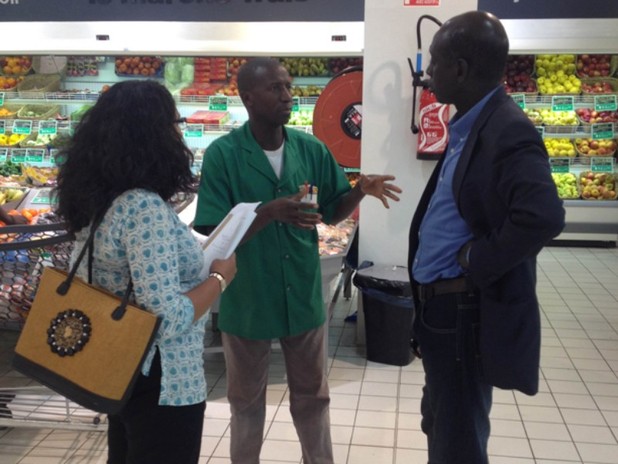February 24, 2014
IDEO.org Global Fellow Shalu Umapathy and Senior Editor Aaron Britt learn more about post-harvest food losses in Senegal by speaking with grocery stores owners and local market sellers.
Today Shalu Umapathy and I zipped around Dakar from market to office to bank to market again to better understand the value chain of smallholder farmers in Senegal. Two of the most interesting stops were at different ends of the consumer experience: The first at the swish supermarket Casino in the even swisher Seaplaza shopping center and the other at Marché Kermel, a bumptious swirl of commerce housed in an vast Victorian pavilion.
We chatted up Babakar Coly, green-smocked captain of Casino’s produce department. Nipping quickly between our inquisitive duo of IDEOers and actual paying customers, Coly described how and where Casino gets its greens.
I expected that the supermarket chain would have a pretty codified buying style, but Coly told us that Casino’s large suburban warehouse happily buys from small farmers provided the quality of the goods is high.
When we probed further into our real quarry—how goods spoil and what he does about it—Coly told us that Casino invariably buys about five percent spoiled produce. There’s no way around it. That number struck Shalu and me as awfully low, but as Coly himself sorts the wheat from the chaff (ah the ag puns!), he should know.
Next up was the odiferous Marché Kermel, where we talked with a charming woman there vending veggies from her son’s farm. We learned that he lives about 15 km from Dakar and that for her stall in Marché Kermel’s concentric circles of buying and selling, she pays 150 CFA each day. That’s about 40 cents.
Spoilage was a far more severe problem for her that Coly. She noted that nearly half of her son’s crop spoils. In the hot season it’s worse, though then he pays for cold storage. Turns out everyone in the market uses the same storage facility when the temperatures soar.
As for what to do with the spoiled goods, especially when you can’t feed them to your wandering livestock? An answer all too common in big cities: I pitch them in the dumpster.




